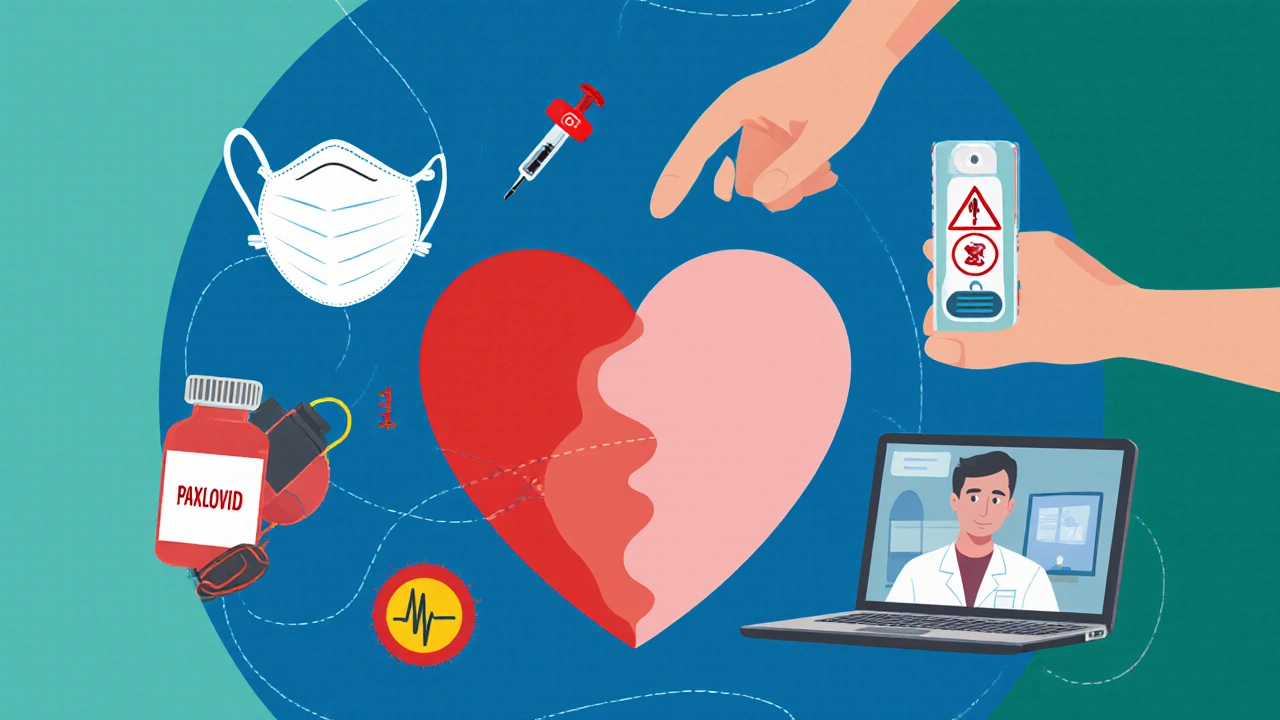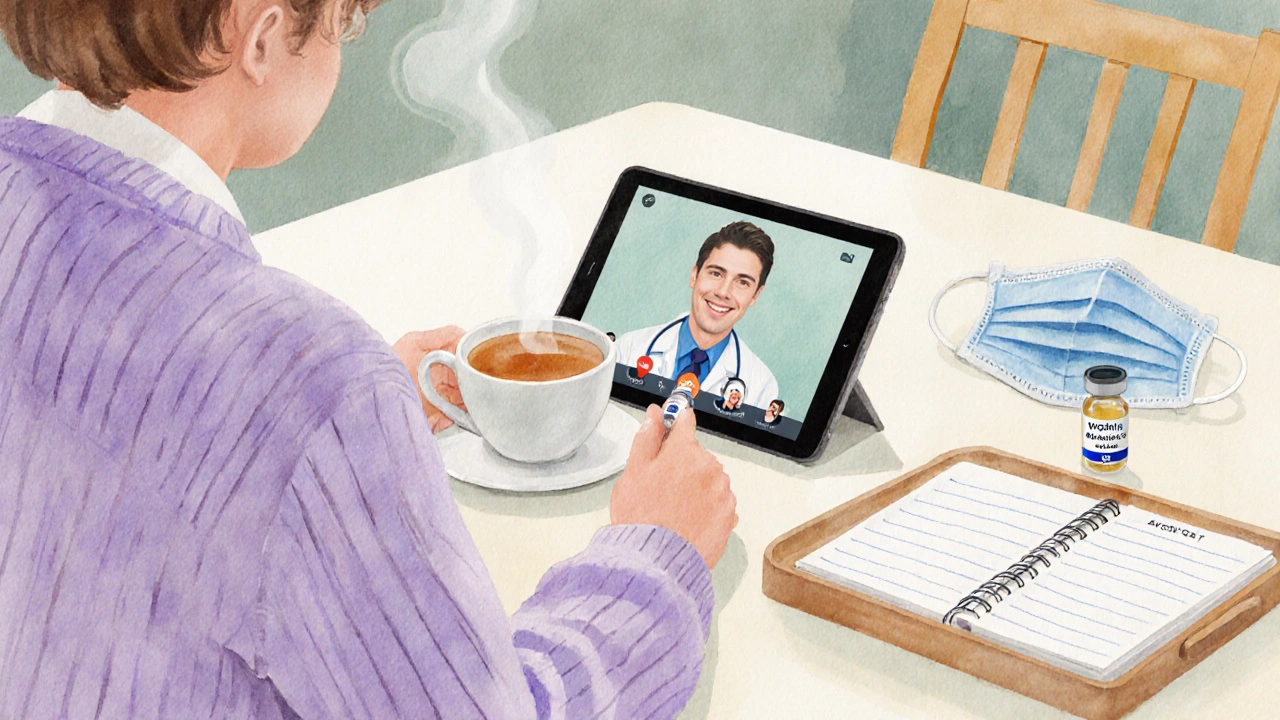
This tool helps estimate your risk level for severe complications from COVID-19 if you have heart failure. Answer the following questions based on your current situation.
Your risk assessment will appear here after you click "Assess My Risk Level"
Minimal risk factors. Follow general precautions and stay up-to-date with vaccinations.
Some risk factors present. Take extra precautions and consider discussing antiviral treatment with your doctor.
Multiple risk factors present. Discuss with your doctor about preventive measures and antiviral treatment options.
When the COVID‑19 pandemic hit the world, everyone scrambled for answers. For the roughly 64 million people living with heart failure, the stakes felt even higher. Suddenly, a virus that mainly attacks the lungs also became a direct threat to a heart that’s already struggling to pump blood efficiently.
Heart Failure is a condition where the heart cannot pump enough blood to meet the body’s needs, leading to fatigue, shortness of breath, and fluid buildup. At the same time, COVID-19 is an infectious disease caused by the novel coronavirus SARS‑CoV‑2, marked by fever, cough, and in severe cases, respiratory failure. Understanding how these two health challenges intersect is crucial for staying safe during the ongoing pandemic.
The virus can aggravate the heart in three main ways:
Data from the UK’s National Health Service (NHS) in 2024 showed that patients with pre‑existing heart failure were 2.8 times more likely to need intensive care than those without cardiovascular disease.
Not every heart failure patient faces the same level of risk. Several factors stack up the danger:

Staying safe isn’t about panic; it’s about smart, evidence‑based steps:
Regular follow‑up visits are still vital, but the way they’re delivered has evolved.

Beyond vaccines, several therapeutic options reduce COVID‑19 severity for high‑risk patients:
| Action | Why It Matters | How Often |
|---|---|---|
| Get up‑to‑date booster | Boosts immunity, lowers severe disease | Every 6‑12months |
| Wear N95 mask indoors | Filters out >95% of airborne particles | Whenever you’re inside crowded spaces |
| Daily weight check | Detects fluid buildup early | Every morning |
| Pulse‑ox reading | Monitors oxygen levels for silent hypoxia | Twice daily if you have symptoms |
| Telemedicine visit | Keeps care continuity without exposure | Every 3‑4weeks or as advised |
Never stop without talking to your cardiologist. Some drugs, like ACE inhibitors, may need temporary dose adjustment, but abrupt cessation can cause worsening heart failure.
Yes. Large‑scale studies in 2024 involving over 30,000 heart failure patients showed no increase in adverse cardiac events after mRNA boosters.
Call emergency services immediately. Shortness of breath could signal a heart failure flare, COVID‑19 pneumonia, or a combination of both.
Paxlovid interacts with some drugs metabolized by the liver. Your doctor will review your medication list and may adjust doses of certain heart drugs.
If you have symptoms, test immediately. If you’ve been exposed, test 48hours after contact and again at day5. Routine screening isn’t required without exposure.
By staying informed, keeping up vaccinations, and using telehealth wisely, heart failure patients can navigate the pandemic with confidence. The virus may still be around, but the tools to protect yourself are clearer than ever.
Well, isn’t this a gem? A shiny new risk tool that tells you how likely you are to get wrecked by COVID when you already have a heart that can barely keep up with a brisk walk. It’s almost as if the universe decided to give us a checklist for doom and then hand us a glittery pen to mark our fate. Sure, follow the general advice – get vaccinated, wash your hands, wear a mask – but if you’re over 75 with a LVEF below 35%, you might as well start drafting your will now. And for those living in a multigenerational house? Good luck trying to convince grandma that “no, we don’t need to share a bathroom forever”. Thanks for the reassurance, tech gods.
Alright folks, let’s unpack this a bit. The risk calculator gives a decent overview, but remember it’s a model, not a crystal ball. Age and LVEF are solid predictors, yet the real world throws in things like medication adherence and socio‑economic factors that aren’t captured here.
For those at moderate risk, it might be worth talking to your cardiologist about booster shots and perhaps early antiviral therapy if you test positive. And hey, if you’re in a high‑density apartment, consider a HEPA filter – it can be a game‑changer. Stay vigilant, stay informed, and most importantly, keep the conversation going.
First of all, congratulations on creating a tool that, while aesthetically pleasing, feels a bit like a *choose‑your‑own‑adventure* for those already battling heart failure!; however, the language used in the tool could benefit from more precise medical terminology. For instance, “Other serious conditions” is vague; could we specify categories like autoimmune diseases or malignancies? Also, consider adding a disclaimer about the limitation of online calculators – they are not a substitute for professional medical advice!; and perhaps a link to reputable sources for antiviral treatments would be appreciated. Overall, great start, but a few edits could make it truly robust.
Nice tool, concise and helpful.
Here we go, another digital oracle promising to quantify the unquantifiable, and I can’t help but marvel at the audacity. First, the premise that a handful of checkboxes can capture the nuanced interplay of cardiac output, pulmonary pressures, and viral load is, frankly, a bit naive. Yet, we live in an era where data has become the new religion, and the faithful will cling to any metric that promises a sliver of control in an otherwise chaotic pandemic.
Let me walk you through the labyrinth of risk: Age, the relentless tick of the biological clock, is a well‑established factor, but why is the tool limited to three age brackets? A 66‑year‑old and a 74‑year‑old share vastly different comorbidity profiles, yet they are lumped together.
The Left Ventricular Ejection Fraction, yes, that golden number indicating how well the heart pumps, is reduced to a simplistic three‑tier dropdown. Sure, an LVEF below 35% screams high risk, but the trajectory matters too – is it a chronic decline, or a sudden plunge post‑myocardial infarction?
Now, onto comorbidities. Diabetes, CKD, COPD – all the usual suspects – but the tool merely counts them, without weighting severity. A patient with end‑stage renal disease on dialysis faces a different threat landscape than one with early‑stage CKD.
Living situation, a clever inclusion, acknowledges the social dimension of infection spread. Yet, “high‑density area” is a broad brush; a 20‑person dormitory differs from a 2‑bedroom apartment complex.
Here’s the kicker: the risk score is a sum of points, oblivious to potential interactions. A 78‑year‑old with a LVEF of 30% and COPD isn’t simply the sum of three independent risks; the combination amplifies vulnerability in a multiplicative fashion.
And what of the psychologic burden? The calculator spits out a label – low, moderate, high – which can either empower patients to take action or doom them to fatalism.
Nevertheless, I won’t dismiss the utility entirely. For patients seeking a quick self‑assessment, it can be a prompt to seek professional counsel, not a verdict.
In practice, I advise clinicians to use such tools as conversation starters, not diagnostic endpoints. Discuss the results, contextualize the numbers, and tailor interventions – perhaps a pre‑emptive antiviral regimen for high‑risk individuals, or intensified monitoring for those at moderate risk.
Ultimately, this tool reflects the balancing act between accessibility and clinical nuance. It’s a step forward, albeit a tentative one, in democratizing health information during a pandemic that has tested our healthcare systems to their limits.
So, dear readers, use it wisely, discuss it with your healthcare provider, and remember that every number on a screen is a shadow of a much richer, lived reality.
Alright, let’s talk about the practical side of this risk tool – it’s kind of like a quick triage checklist you can actually use at home. First thing, the age brackets: if you’re over 65, you already know you’re on higher alert, so make sure you have your vaccination records handy. Next, the LVEF numbers – if your doctor told you it’s under 35%, consider discussing early antiviral treatment; the sooner you intervene, the better.
Don’t forget those comorbidities checkboxes – diabetes, CKD, COPD – each one adds a point, so the more you tick, the more urgent your follow‑up should be. And if you live in a crowded apartment or a multigenerational home, you might want to invest in a good air purifier; trust me, it helps.
Overall, think of this tool as a nudge to have a proactive conversation with your cardiologist. And hey, stay safe out there! 😊
Yo, this tool is kinda ok but seriously, who made those drop downs? At least have more options or the numbers dont make sense. Also the UI looks like a cheap 90s website and the code seems sloppily thrown together.
Honestly felt a bit overwhelmed reading all that. The tool seems helpful but also kinda scary. I guess I’ll just talk to my doc and see what they say.
Listen, if you’re going to rely on a web form for life‑or‑death decisions, you better make sure it’s backed by real science. No one wants a half‑baked calculator telling them they’re doomed. Get a proper risk assessment from a qualified professional, not some glorified quiz.
Tool looks decent but missing data on med adherence and social factors.
Great initiative! The interactive layout makes it easy to understand personal risk, and the color‑coded risk levels are super helpful for quickly seeing where you stand. It’s especially useful for those of us juggling multiple health concerns – just a few clicks and you get a clear picture. Keep it up!
Hold up! Before anyone jumps on this risk calculator, you’ve got to understand the hidden layers of the pandemic. First, the whole notion that a web‑based tool can capture the complex immunologic response to SARS‑CoV‑2 is, frankly, dangerous. The developers have omitted key variables like viral variant prevalence, individual antibody titers, and even the impact of prior vaccinations. Have they considered the possibility that the virus is being weaponized? It’s not just about ticking boxes – it’s about the silent data collection happening behind the scenes, feeding algorithms that could be used for population control.
And let’s not forget the socioeconomic angle. People living in high‑density housing are disproportionately affected, yet the tool lumps them into a generic “high‑density” category without accounting for ventilation, occupancy limits, or even access to PPE. It’s a classic case of ignoring systemic inequities while presenting a veneer of scientific rigor.
Furthermore, the tool assumes a linear additive risk model. Real‑world data shows that comorbidities interact synergistically – a patient with both COPD and CKD is not just +2 points; the risk escalates exponentially. The calculator’s simplistic point system is a sugar‑coated way of downplaying the true danger for vulnerable populations.
If you’re a patient reading this, I urge you to seek a face‑to‑face consultation with a specialist who can evaluate your personal health narrative, not rely on a one‑size‑fits‑all online form. And for the developers: step up your game, incorporate granular data, and be transparent about the algorithm’s limitations. Otherwise, you’re just adding another layer to the misinformation web.
Thanks for the detailed breakdown, Jefferson. While there are certainly limitations, I think the tool still serves as a useful first step for many patients. It encourages them to consider their risk factors and potentially reach out to their healthcare providers sooner rather than later. Let’s keep refining it together.
Wow!!! This is a roller‑coaster of emotions!!! On the one hand, the calculator shines like a beacon of hope for those desperate for clarity!!! But on the other hand, it drags us through a murky swamp of oversimplification!!! The vibrant colors-red for danger, amber for caution, green for safety-are a visual feast!!! Yet, the reality behind those hues is a tangled web of variables that no simple checkbox can capture!!! Still, kudos to the creators for trying to empower patients!!! Let’s keep the conversation alive and demand even more nuance!!!
